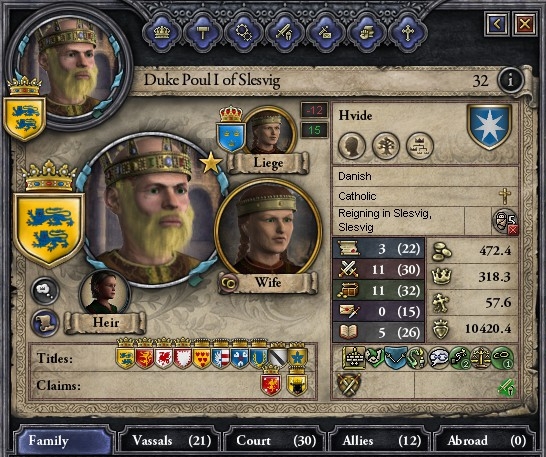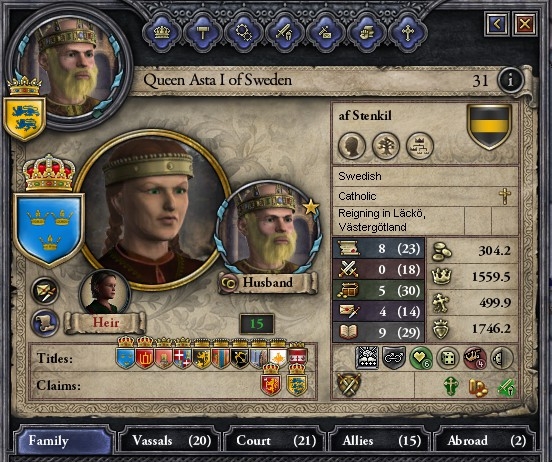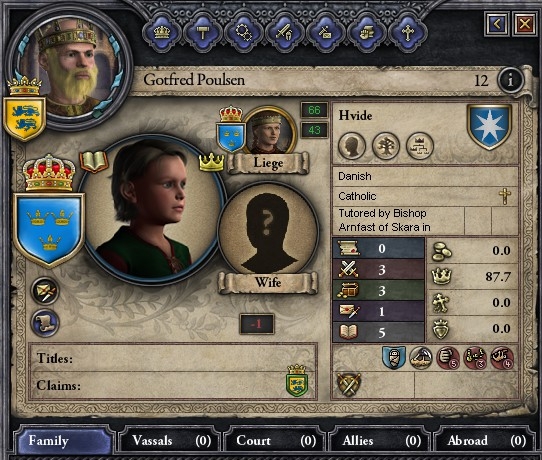Part 19: Into The Blue

"Good morning, class, and welcome back to European History 2008. My name is Haquita Caxin If you're back here for another year of reading about the lives of dead paleskins then you either think it's an easy Credit or you know something I don't. But I'm not here to speculate on your motives - I'm here to talk to you about the evolution of the nation-state of Sweden-Lithuania and the strange coincidences that brought it to pass."
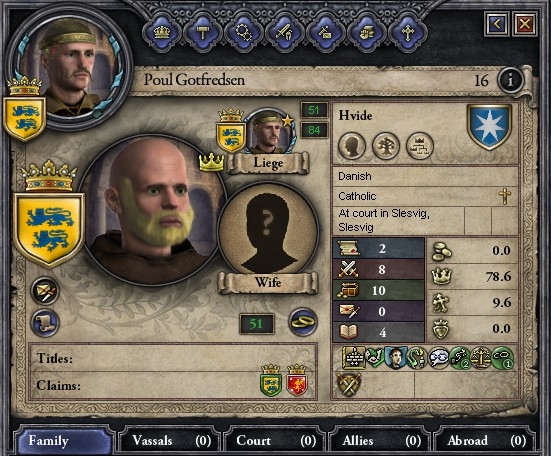
"It starts with this man: Poul Gotfredson, of the Hvide family which you should already be familiar with. He was the second-born son of Gotfred Hvide, who was notable for being a good friend to our people and showing courage and mercy in the invasion of Spain - but you should know all that already. It was pure chance that Poul was in line for the throne at all after his elder brother Torben was struck down by pneumonia.
"Why was it so important for Europe that Poul rise to the throne at this exact moment?"
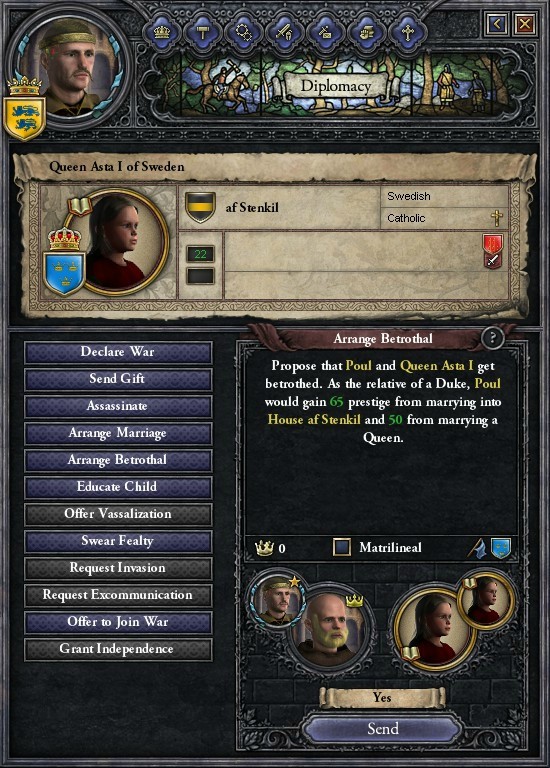
"Because Torben was not the only one who had died of plague recently.
"The Royal Family of Sweden had been decimated by disease, leaving only a fourteen year old girl to reign in Sweden. And so it was that the house af Stenkil, who had reigned in Sweden for hundreds of years, was destroyed by the whim of a teenager who knew or cared nothing of politics. She naively accepted a marriage with Poul Gotfredson even though it meant the death of her family line and their claim on the Throne of Sweden.
"From Queen Asta's diary, we have some insight into her motives for this strategically inadvisable act. One, it would bring the divided Kingdom of Denmark firmly under her banner, which would make Sweden a military powerhouse capable of resisting the Golden Horde that had claimed Finland and the Cathars that had risen in Poland. Two, she was firmly attracted to women and resultingly simply did not care much about family dynastic politics. Three, she was singularly lazy, and preferred to spend her days in reading and contemplation to active scheming and ladder-climbing.
"Still, this was the golden opportunity the House of Hvide had long been awaiting; this was their ticket to Kingdom."
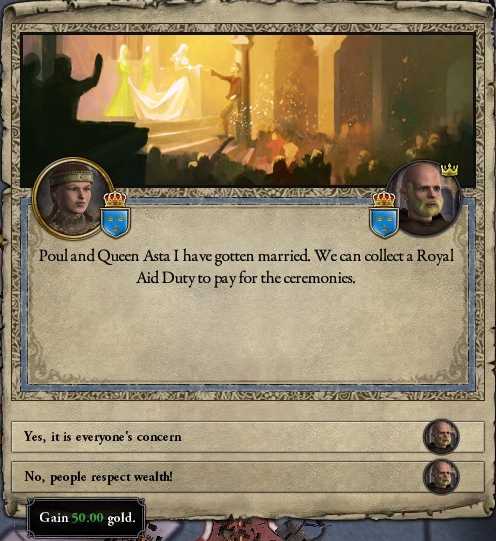
"The wedding was a marvellous affair by European standards of the day, and Poul Hvide was crowned King of Sweden."
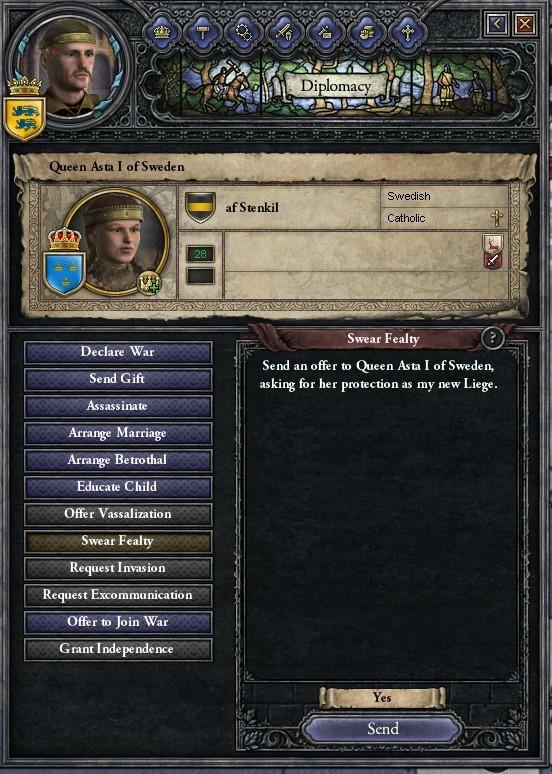
"In order to hold up their end of the bargain, Gotfred Hvide swore fealty to the Queen of Sweden, uniting the Scandinavian crowns."
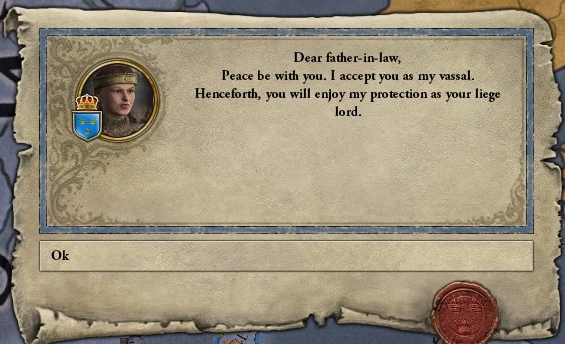
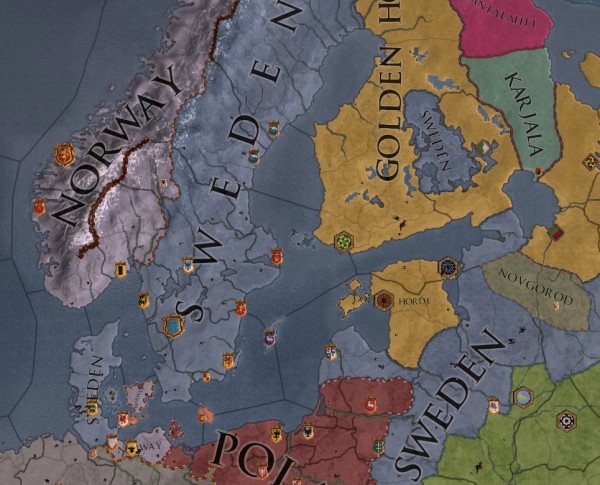
"And through that quirk of disease and personality was formed the united Kingdoms of Sweden, Denmark and Lithuania. Other than the Holy Roman Empire, Scandinavia was the greatest surviving European nation - and was surrounded with opportunities for expansion."
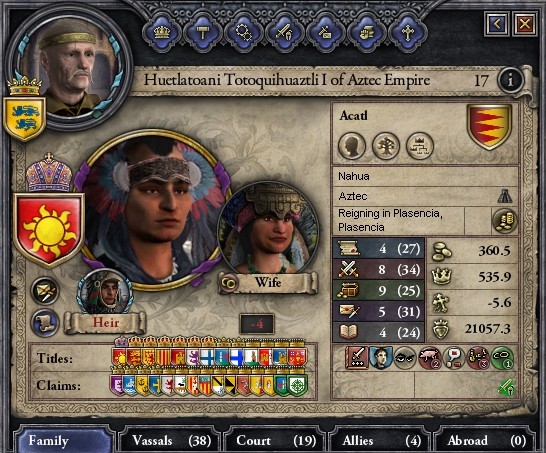
"For some surrounding context, this was the moment when the Sunset Invasion was starting to falter. The Emperor had died of Smallpox, like so many others. This had left his far less capable son to take the reins, one you should all know as Huetlatoani I. His greatest sin was that he was a cynic, unlike his father who had commanded a holy war to conquer the world, and his cynicism lead to greed rather than glory."
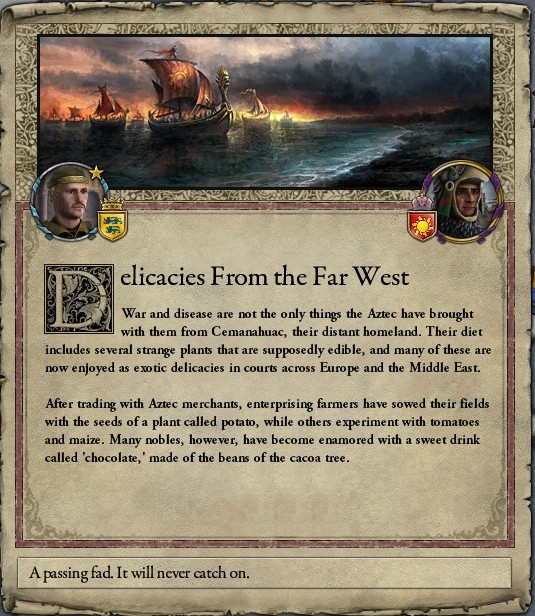
"Huetlatoani commanded that trade be opened with all European nations, opening the flow of vegetables and spices to the paleskins and making the Aztec Empire extraordinarily wealthy in the process. With this wealth, the Empire purchased many slaves and took back many European treasures and works of art across the sea."
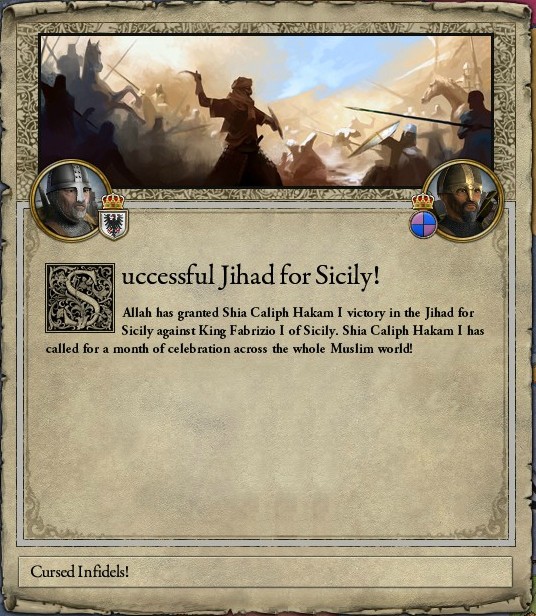
"In the south, the endless European holy wars continued, with Catholicism taking another severe blow and losing one of it's very few remaining Kingdoms."

"By this point, Scandinavia, Ireland and the Holy Roman Empire were the only three nations who held allegiance to the Pope of Rome."
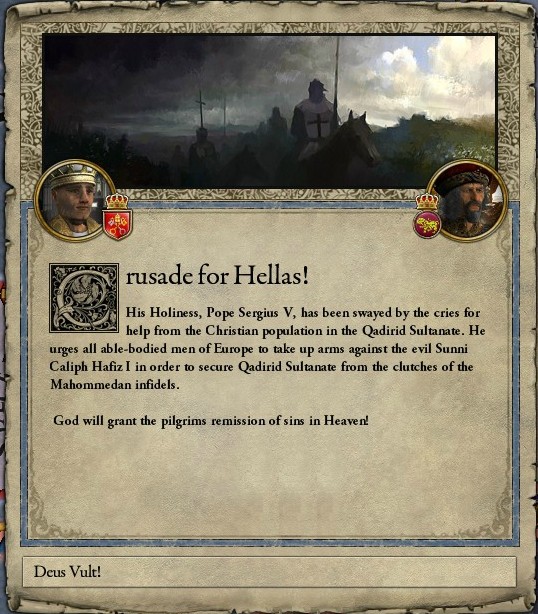
"Out of desperation, the Pope ordered a final crusade against the Infidels of Greece. This was to be the second such, but this time Greece truly was occupied by the Muslims."
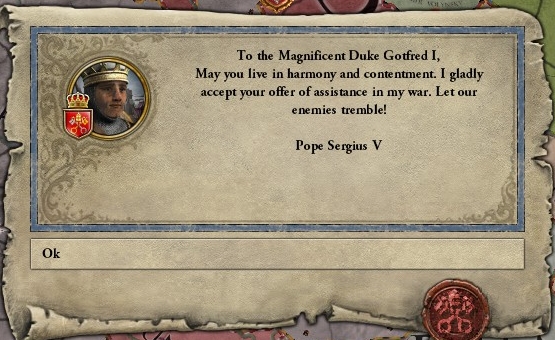
"The House of Hvide continued it's tradition of faithful service for volunteering for the Crusades, and they were rewarded by some good news:"
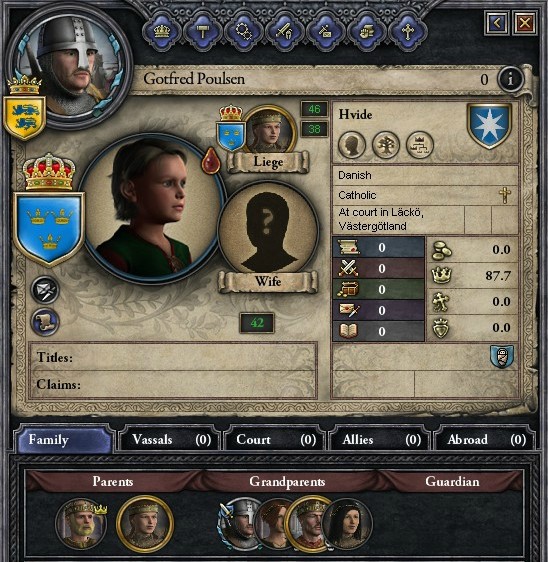
"Queen Asta had given a child. House Hvide was one heartbeat away from reigning in Sweden uncontested."

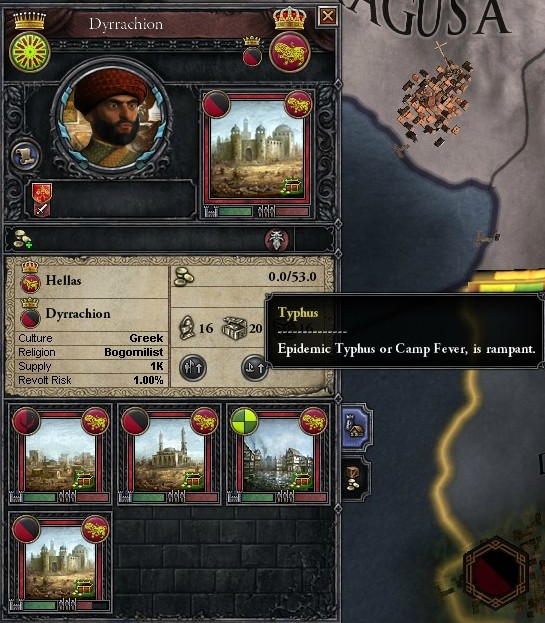
"The Greek campaign, while bravely fought by the Christians, was doomed to failure by the pitiful showing. As if that was not enough, Greece was struck by typhoid fever in the midst of the campaign, slaughtering the meagre Christian armies where they stood."
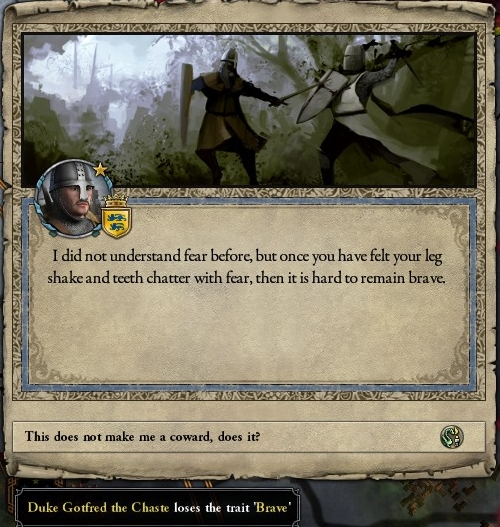
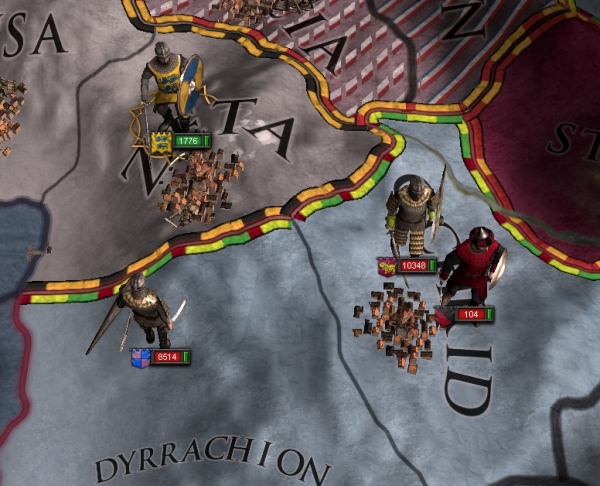
"Demoralised, the defeated Christians retreated in such shame it seemed unlikely that another Crusade would ever be held."

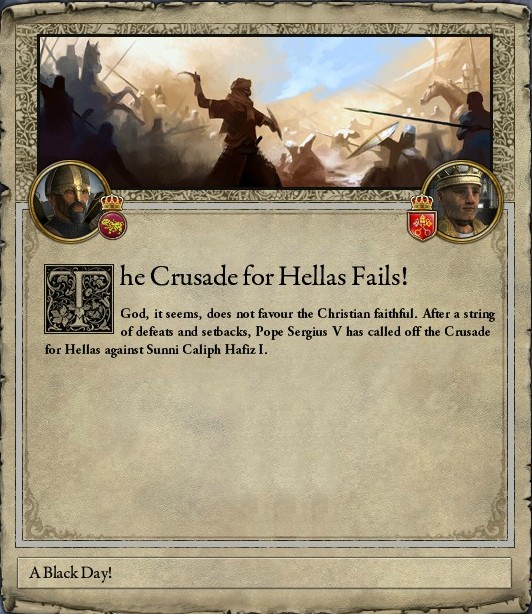
"The failure of the Crusade was due to lack of showing - only a meagre gaggle of dukes opted to support it, against three mighty Muslim Sultans. This in turn was directly the result of the chronic spread of Catharism and other Christian heresies throughout the Christian nations, and as support for the Pope plummeted so did Christianity's ability to launch an organised resistance to the enemies at their gates."
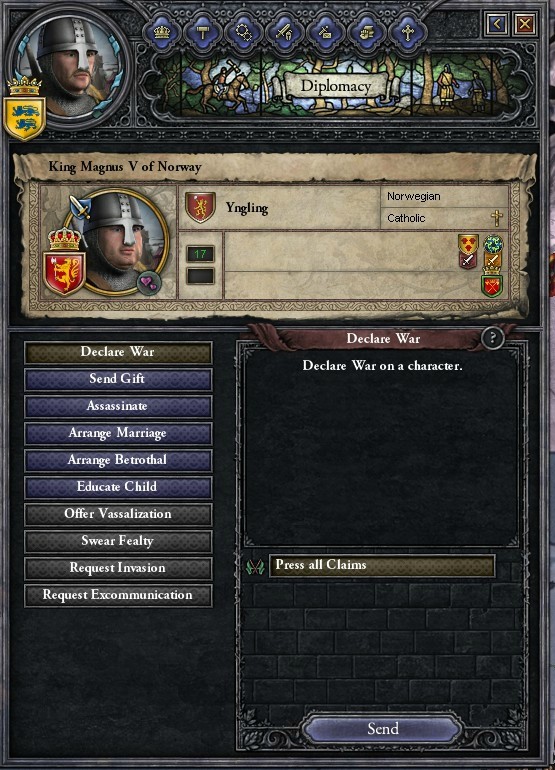
"So the Christians turned back to their own problems.
"Since joining the Swedish Kingdom, the Hvides of Denmark had gained access to enormous taxation advantages that came with a centralised state, almost immediately increasing their yearly revenue by 50%. They had saved this money to hire a mercenary army which they now wielded against the King of Norway to remove him of his final few Danish territories."
"Unfortunately, this move pitted the House of Hvide against King Wawrzynic of Poland, popularly known as 'The Devil'. King Wawrzynic was a curious historical case, having had a long alliance with House Hvide and being a staunch believer in Catholicism even as his entire nation turned to Catharism. He maintained a bloody rule, forcing conversions at swordpoint and butchering his own people for heresy, but now he finally turned his army against House Hvide and moved to kill his fellow Catholics."
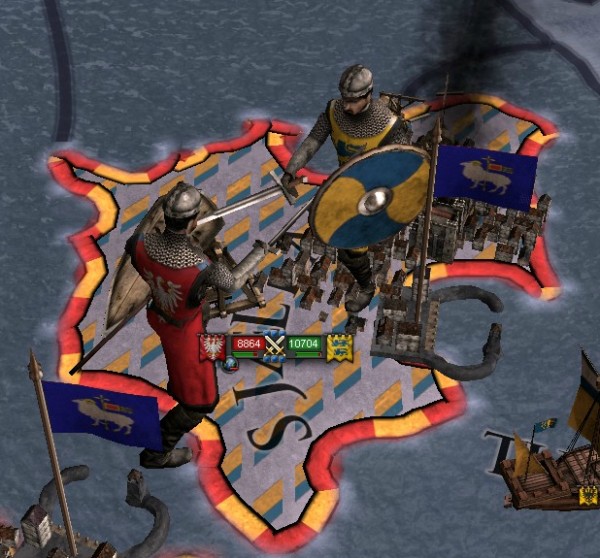
"The Polish armies engaged the Danes in the field, and the once allies who had stood together against the Golden Horde now laid waste to each other. Although not the largest battle of Medieval Europe, this was certainly one of the most storied, for it proved to be the end of the Devil."
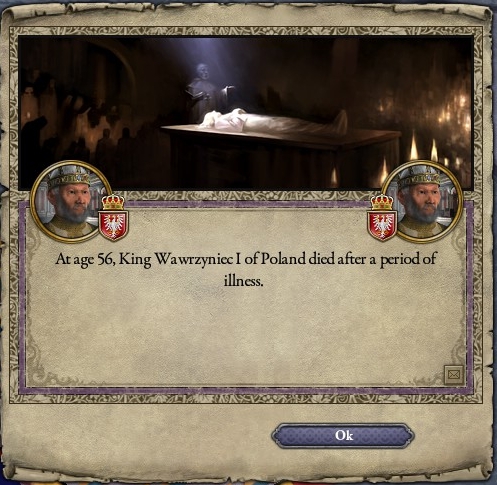
"A terrible injury inflicted by a Danish footman became infected, and quickly claimed the life of King Wawrzynic. As he slipped away, so did the Polish involvement in the war - and the last of his legacy. The cruel, hunchbacked homosexual had almost cost Denmark everything by his stubborn pride, but Denmark had cost him more."
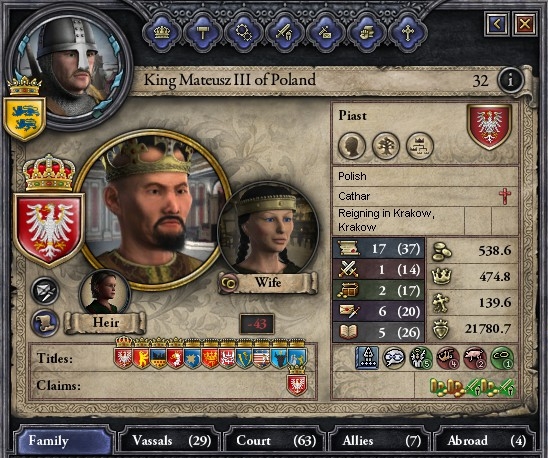
"For Wawrzynic's firstborn son had also converted to the Cathar faith, like so many of his countrymen rendering all the slaughter Wawrzynic had done to keep it out of power meaningless. Poland was now formally a Cathar nation."
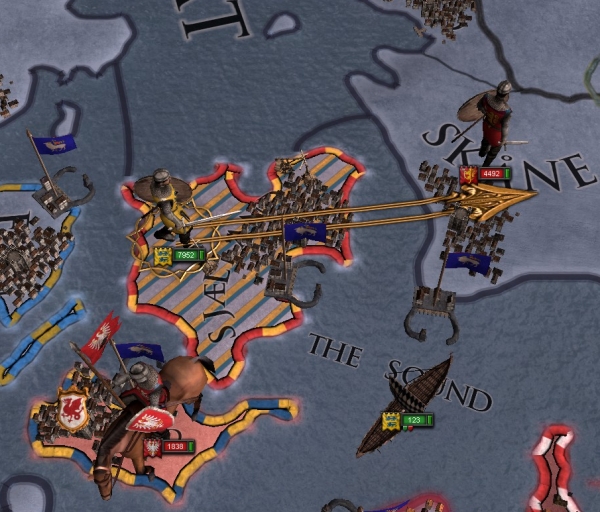
"But with the Polish out of the question, the Danes were able to finally corner and defeat the Norwegians."
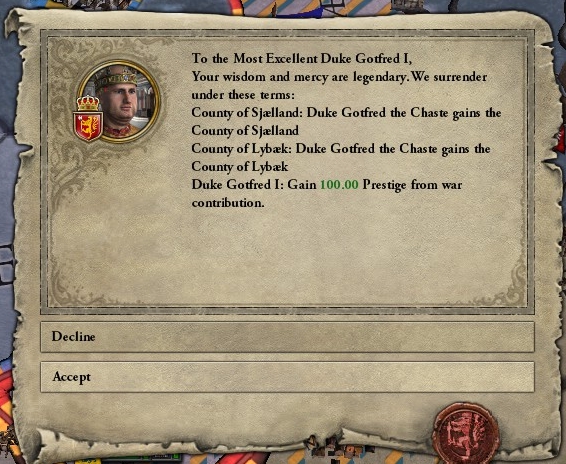
"After the battle was finally over, the King of Norway conceded the majority of his land in Denmark, bringing the Hvide dream that much closer to fruition."
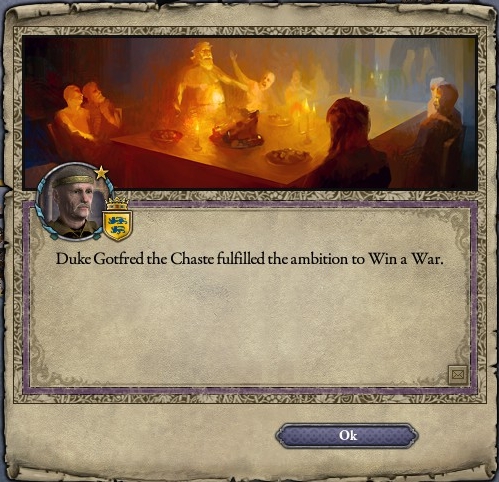
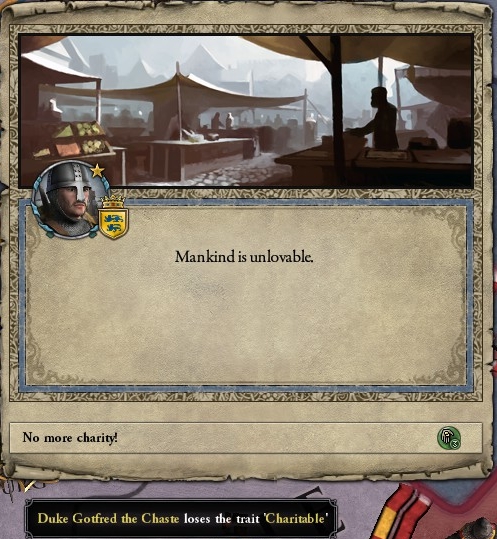
"A victory that was less celebrated than it might have been. Duke Gotfred had passed his fiftieth birthday before he had finally managed to win a single war, and he found the achievement hollow."
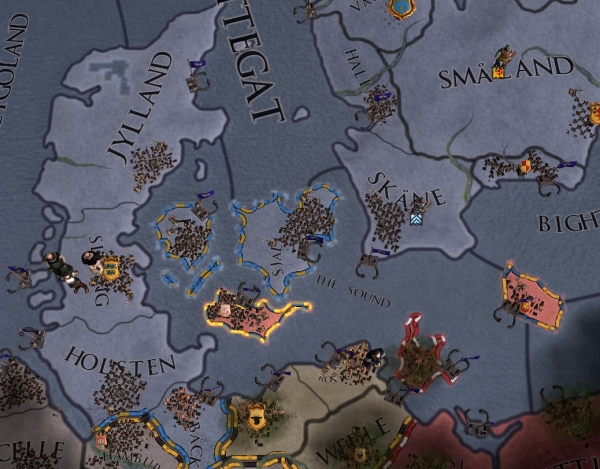
"But finally, Denmark was nearly whole."
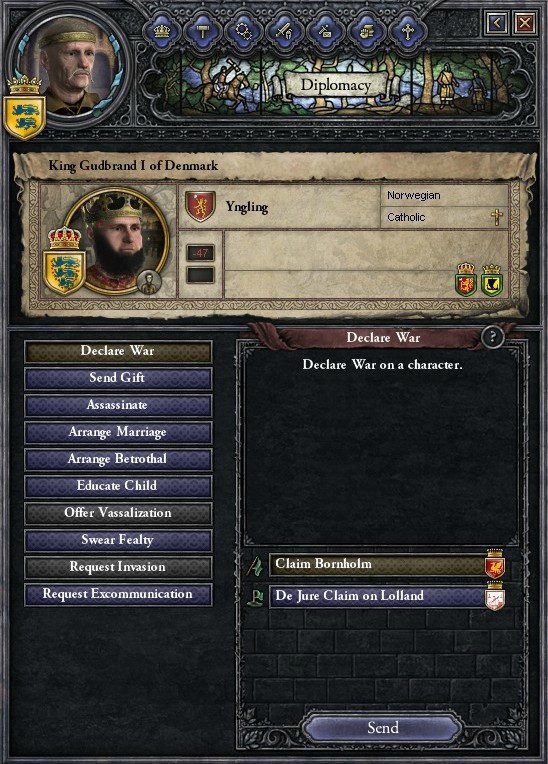
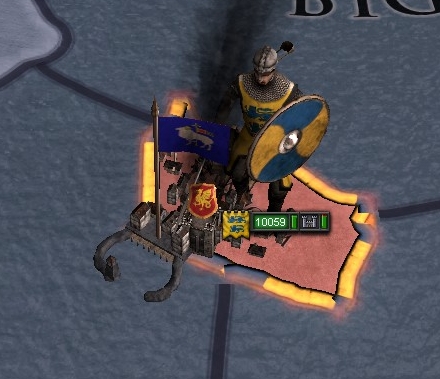
"A quick followup campaign, more an event than a war, closed the gap just a little more."
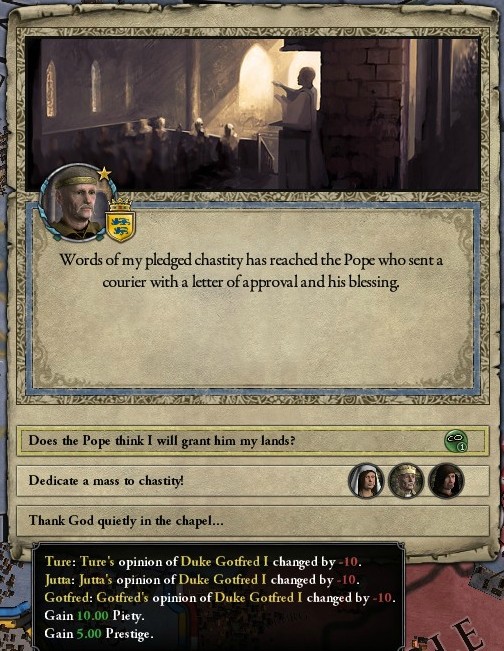
"The Pope, uneasy about the vast loss of Church holdings, delicately asked if Denmark intended to stay Catholic. Duke Gotfred grudgingly affirmed it with a mass."

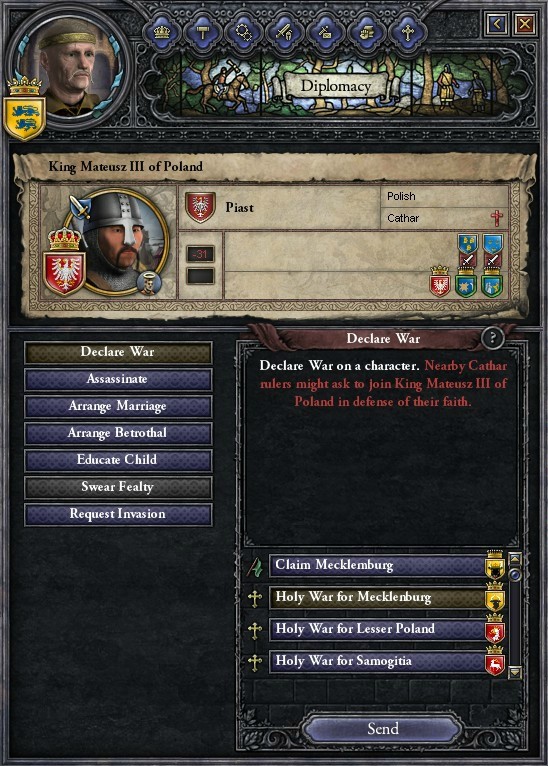
"And then he turned his eyes towards doing the Pope's work - reclaiming Poland from the Cathars.
"Queen Asta had ordered an invasion already, which Duke Gotfred used as cover for his own campaign to seize territory. These holy wars were purely aggression-based land grabs by the Catholics, but they considered it necessary in order to secure Catholicism against the invading hordes."
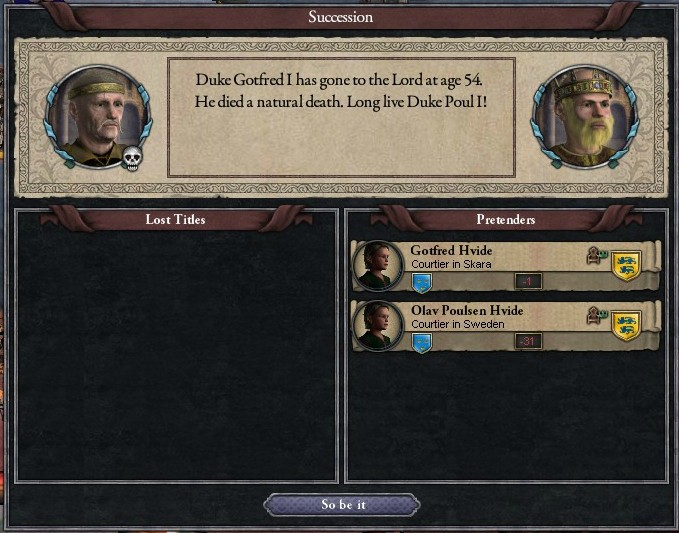
"Duke Gotfred passed away soon afterwards, leaving Scandinavia in a commanding position in the Baltic. While once before, hard work and scheming had brought the line of Hvide to the ranks of the Kings, this time pure luck had made them heirs to an empire they could barely have imagined."
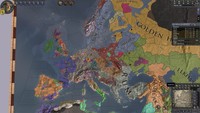
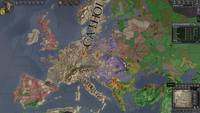
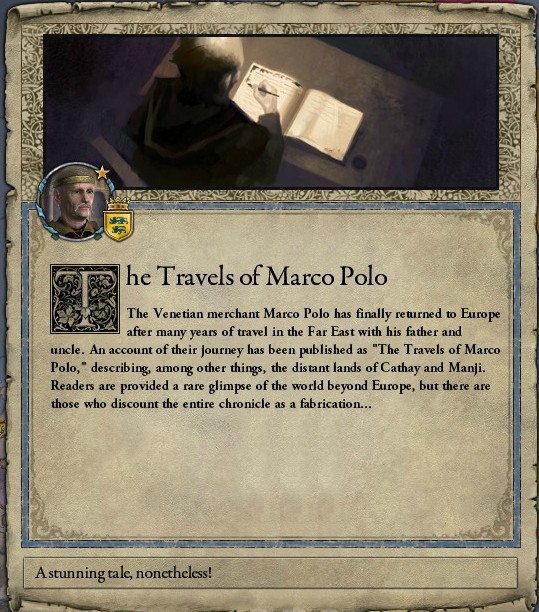
"So, to put this in context with the other events of the time:
- The United States of England had rebelled against the Aztec Emperor's authority. Driven by merchants and colonists, they sought a reprieve from taxes and the demands of holy war.
- An Aztec trader and explorer living amongst the Europeans travelled far to the east and returned bearing stories of a celestial empire that rivalled our own.
- The Muslim nation of Rum had risen up, claiming the succession of Rome as the Byzantines once had.
- The Holy Roman Empire was disintegrating in heresy and civil war.
- Roman Catholicism was on the way out.
The year 1300 was one of the most interesting and intense moments in European History."
